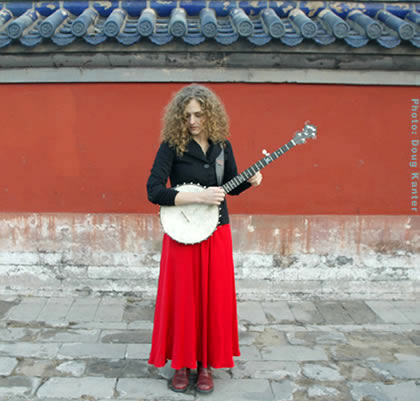
SONG OF THE TRAVELING DAUGHTER • Abigail Washburn
What first looks like a very original angle is actually a hell of a tale. Chinese language scholar turned lobbyist chances to fall in with her string band buddies into a crash course in banjo and an Alaskan tour. Reinvents herself as a musician, joins an all girl string band. Takes second in a prestigious song contest. Combines her fascination with China and mountain music and co-writes songs in Chinese. Gigs on both continents. An overheard conversation in a coffee shop lands her a record deal. Sound like anybody you know? Me neither. Pretty amazing story.
And every aspect of the project is masterfully handled. Bela Fleck’s and Reid Scelza’s co-production with the artist, Bob Delevante’s brilliant photographs, W. Stacy Vereen’s superior design, the startling musicianship that creates a credible and memorable bridge between the cultures. Ben Sollee’s cello ties it all together in miraculous ways, and Casey Driessen on fiddle is always remarkable, certainly here. Jordan McConnell of the Duhks shines on guitar and guit-jo. Blue Merle’s Beau Stapleton co-writes two strong songs, one of which took second at MerleFest. Amanda Kowalski, known also for her fine work with Adrienne Young, resounds on string bass. Bela contributes some resophonic guitar and some banjo in inimitable fashion.
Abigail Washburn is possessed of a lovely voice, suited to the mountain music of our culture and also to the lyrical singing of the Chinese language. The scholar points up the interesting fact that the language is largely composed of one and two syllable words that frequently end with open vowels. She is very adept at clawhammer banjo, and the record opens with a lyrical passage on her 2003 Ome Old-time banjo, what a tone. I enjoyed the idea in the notes of each player being listed with the instruments they were playing, make, model and year. It spoke to the kind of musician that Abigail is, and how she feels about the heritages with which she is involved.
The material is impressive, very inventive. "Eve Stole the Apple" is a standout, subtly combining many musical elements and styles, and we liked the lighthearted groove of "Coffee’s Cold," which gave a lift to the sometimes very serious atmosphere of the record. The Chinese songs were great, very natural sounding combination. When I was living in Shanghai, I heard a beautiful instrument called the sanshen (literally "three string") that reminded me directly of a gut string banjo, so in some ways this bridge made perfect sense to me. My mind reels (and I’m sure many do) when I consider the possibilities of a bilingual American artist attempting to make a cultural musical bridge between our folk culture and that of a country of 1.3 billion people, a quarter of the world’s population.
Since that concept is so compelling, I am excited that the attempt here is so artistically achieved. Abigail Washburn has made an unprecedented and stunning debut. She has begun carving where the wood was untouched, and the shape of her musical sculpture has just begun. We certainly look forward to seeing it further emerge. • Frank Goodman
[Watch for an interview with Abigail Washburn in our September issue.]
return to covers listen to clips buy it here
abigailwashburn.com nettwerk.com